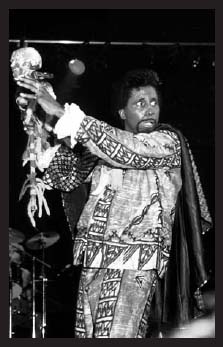The Encyclopedia of Dead Rock Stars (221 page)
Read The Encyclopedia of Dead Rock Stars Online
Authors: Jeremy Simmonds

Doris Kenner-Jackson (as she was now known) reunited with various Shirelles for two nostalgia tours during the seventies and eighties, but by the end of the following decade she’d become gravely ill with breast cancer. She died in hospital in her adopted home of Sacramento, California.
See also
Addie ‘Micki’ Harris ( June 1982)
June 1982)
Monday 7
Big Pun
(Christopher Lee Rios - The Bronx, New York, 9 November 1971)

Formidable Christopher Rios – who, like many rappers, operated under a variety of pseudonyms – is widely credited as the man who gave Puerto Ricans a voice in the otherwise blackdominated world of New York hip hop. Although his handle was ‘Big Punisher’, Rios was actually a genial sort, a family man with three children and a little more to his shtick than dealing and gunslinging. Before his death, Big Pun’s career had barely started, but he’d managed to cash in on the vogue with a double-platinum, Grammy-nominated debut album,
Capital Punishment
(1999), on Loud. By his own admission, Pun ate ‘‘til he couldn’t tie his shoelaces’, addressing his weight problem through his lyric-writing – hence self-deprecating song titles such as ‘I’m Not a Playa, I Just Crush a Lot’. Widely respected within the field, Pun had worked with Wyclef Jean, Busta Rhymes, Wu-Tang and longtime collaborator Big Joe – whose 350 lb girth he utterly dwarfed.
Pun’s almost inevitable coronary took him just ahead of the release of a second album,
Yeeeah Baby!
(2000): he was enjoying hit status as a guest vocalist with Jennifer Lopez when his increasing mass (rumoured to have reached an astonishing 700 lb) finally floored him.

Big Pun: Don’t get up …
‘Lonesome’ Dave Peverett
(Dulwich, London, 16 April 1943)
Foghat
(Savoy Brown)

Dulwich-born Dave Peverett made the unlikely transition from the London blues circuit to the American mainstream by the mid seventies. Dubbed ‘Lonesome’ by his early bandmates, Peverett graduated from blues journeymen Savoy Brown, taking with him bassist Tony Stevens and drummer Roger Earl, and picking up guitarist Rod Price, to form the band Foghat (the name derives from a Scrabble session he had as a boy), which became an FM mainstay during the seventies. With Bearsville Records, the band’s boogie-fuelled rock appealed to an entire generation of early air-guitarists, the band achieving an instant hit with 1972’s
Foghat.
From this, the prolific Peverett et al logged a series of popular albums with suitably ‘rawk’ titles like
Energized
(1974),
Rock ‘n’ Roll Outlaws
(1974, containing the Top Twenty single ‘Slow Ride’) and
Fool for the City
(1975). (A 1977 live album showed this group at their best, however, and accordingly sold 2 million copies.)
Foghat’s popularity diminished with the onset of disco and new wave, though both Peverett and Earl toured with versions of the group into the nineties. ‘Lonesome’ Dave Peverett was diagnosed with kidney cancer in 1998, but after much chemotherapy he was able to keep touring until shortly before his death.
See also
Rod Price ( March 2005)
March 2005)
Saturday 12
Oliver
(William Oliver Swofford - North Wilkesboro, North Carolina, 22 February 1945)
(Good Earth)

In 2000, Oliver Swofford became the latest victim of the remarkable ‘curse of
Hair
‘. During the folk boom of the mid sixties, Swofford had fashioned his own college-based bluegrass band The Virginians, set to make something of an impact with a debut album as Good Earth. The undoubted star was Swofford: manager and Four Seasons producer Bob Crewe recommended him to record Lionel Bart’s ‘Good Morning Starshine’ (it was also the work of Bart that prompted the standalone name of ‘Oliver’). The song was a runaway success, soaring to Billboard number three in 1969, and closely followed by an even bigger hit in ‘Jean’, the theme from
The Prime of Miss Jean Brodie.
But though there was a hit album to accompany these big-selling singles, Oliver couldn’t repeat the trick: attempts by United Artists to relaunch him as a ‘serious’ artist also failed miserably. By 1982, in his new career as a builder’s rep, Oliver Swofford was about as far removed from stardom as he could possibly be. He had been living in Shreveport, Louisiana, for four years at the time of his death from cancer.
Golden Oldies #9
Screamin’ Jay Hawkins
(Jalacy Hawkins - Cuyahoga County, Ohio, 18 July 1929)

A wild blues-based performer at a time when ‘clean cut’ seemed the norm, Screamin’ Jay Hawkins never really sold records, but utterly wowed the faithful at live dates - not to mention fellow artists like Fats Domino and Tiny Grimes, who were to book him regularly on their shows. With the possibly unique claim of having borne six children by different fathers, Hawkins’s mother encouraged her son to study classical piano - with a career in opera a distinct possibility. His noted aggression, however, was evident even before Hawkins picked up the guitar in his early twenties, the artist having been a Golden Gloves middleweight champion in his teens. What was key to Hawkins’s work, though, was the inherent humour lacking in that of most of his contemporaries: his demented ‘I Put a Spell on You’ (1956) was accompanied by a highly theatrical borderline-voodoo stage show in which he appeared brandishing a flaming skull known as ‘Henry’ as he was wheeled on in a coffin.

